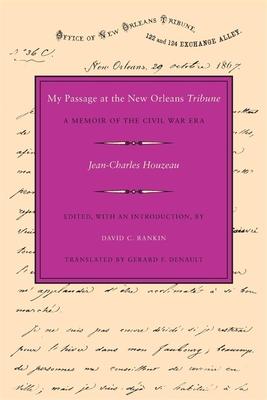When Belgian scientist Jean-Charles Houzeau arrived in New Orleans in 1857, he was disturbed that America, founded on the principle of freedom, still tolerated the institution of slavery. In late 1864, he became managing editor of the New Orleans Tribune, the first black daily newspaper published in the United States. Ardently sympathetic to the plight of Louisiana's black population and reveling in the fact that his dark complexion led many people to assume he was black himself, Houzeau passionately embraced his role as the Tribune's editor and principal writer. My Passage at the New Orleans "Tribune," first published in Belgium in 1872, is Houzeau's memoir of the four years he spent as both observer and participant in the drama of Reconstruction.
Houzeau records the efforts of New Orleans's free blacks to secure their civil rights and to assume as well the cause of the newly freed slaves. With a scientist's keen and sensitive eye, he observes the turmoil of Reconstruction in Louisiana and recalls the per-sonalities of the black leaders, the tensions within the black community, and his own day-to-day struggle to make the Tribune a nationally respected vehicle for the advancement of black rights and equality. Scholars have long recognized the importance of the New Orleans Tribune as a source for both southern and African American history. My Passage at the New Orleans "Tribune," meticulously edited and annotated by David C. Rankin, offers a unique firsthand account of the newspaper's operation and crusade, written by the energetic and dedicated man who guided it to prominence.
My Passage at the New Orleans Tribune: A Memoir of the Civil War Era
When Belgian scientist Jean-Charles Houzeau arrived in New Orleans in 1857, he was disturbed that America, founded on the principle of freedom, still tolerated the institution of slavery. In late 1864, he became managing editor of the New Orleans Tribune, the first black daily newspaper published in the United States. Ardently sympathetic to the plight of Louisiana's black population and reveling in the fact that his dark complexion led many people to assume he was black himself, Houzeau passionately embraced his role as the Tribune's editor and principal writer. My Passage at the New Orleans "Tribune," first published in Belgium in 1872, is Houzeau's memoir of the four years he spent as both observer and participant in the drama of Reconstruction.
Houzeau records the efforts of New Orleans's free blacks to secure their civil rights and to assume as well the cause of the newly freed slaves. With a scientist's keen and sensitive eye, he observes the turmoil of Reconstruction in Louisiana and recalls the per-sonalities of the black leaders, the tensions within the black community, and his own day-to-day struggle to make the Tribune a nationally respected vehicle for the advancement of black rights and equality. Scholars have long recognized the importance of the New Orleans Tribune as a source for both southern and African American history. My Passage at the New Orleans "Tribune," meticulously edited and annotated by David C. Rankin, offers a unique firsthand account of the newspaper's operation and crusade, written by the energetic and dedicated man who guided it to prominence.